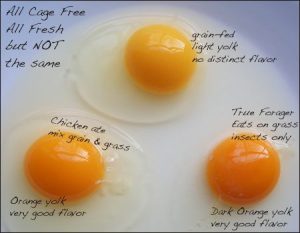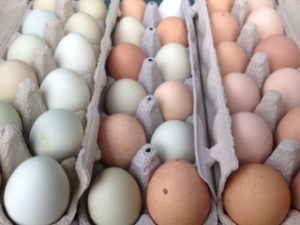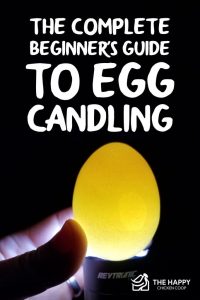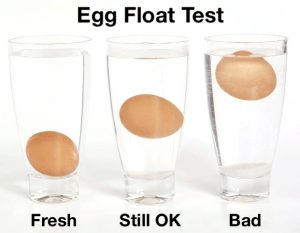What is a Farm Fresh Egg?
Have you ever compared a home-grown, farm fresh egg with an egg from the supermarket? Naturally raised chickens produce yolks that are a deep orange-yellow and taste like the old fashioned farm eggs your Grandma used to make in the mornings!
 Once the eggs are collected, cleaned and dried, they are packaged into egg cartons and labelled with the date when they were collected. Farmers will clean their eggs either by simply brushing off the dirt or by washing them. If the eggs have been washed they must be refrigerated until use as the protective coating will have been removed. Eggs that have been uncleaned will last for a considerable time left out on the counter, which is how the homesteaders kept their eggs.
Once the eggs are collected, cleaned and dried, they are packaged into egg cartons and labelled with the date when they were collected. Farmers will clean their eggs either by simply brushing off the dirt or by washing them. If the eggs have been washed they must be refrigerated until use as the protective coating will have been removed. Eggs that have been uncleaned will last for a considerable time left out on the counter, which is how the homesteaders kept their eggs. If you are purchasing eggs from a farm that has a rooster and is free range breeding there is the possibility of getting an egg with a chick embryo meaning the egg has been fertilized by the rooster. Collecting eggs on a daily basis will ensure that you do not get a fertilized egg.
If you are purchasing eggs from a farm that has a rooster and is free range breeding there is the possibility of getting an egg with a chick embryo meaning the egg has been fertilized by the rooster. Collecting eggs on a daily basis will ensure that you do not get a fertilized egg. Use the FLOAT TEST to check for egg freshness, especially if you are unsure about the age of your eggs: fill a bowl with water and place eggs in it. An egg that floats has too big an air pocket inside the shell; the contents have evaporated too much and it’s likely spoiled. Compost it.
Use the FLOAT TEST to check for egg freshness, especially if you are unsure about the age of your eggs: fill a bowl with water and place eggs in it. An egg that floats has too big an air pocket inside the shell; the contents have evaporated too much and it’s likely spoiled. Compost it.It’s pretty simple: Place an egg in a bowl of water. If the egg sinks, it’s good; if it floats, it’s gone bad. Here’s why: Eggshells are very porous, so as time goes by, the egg loses moisture, causing its contents to shrink. At the same time, a small air pocket inside the shell starts to expand, causing the egg to float in water. Give the egg float test a try—here are three possible outcomes:
- The egg sinks and falls to its side. Hooray, you have a fresh egg!
- The egg sinks, but stands upright at the bottom. Get cracking—your egg is still okay to eat, but you should use it relatively quickly.
- The egg starts to float up slightly. It’s past its peak freshness but might be okay to eat.
- The egg floats. Sorry, but your egg is no longer safe to eat—it’s time to toss it. If you want to double check, crack the egg into a bowl and give it a sniff.
Can you still eat eggs that float?
Not all floating eggs are rotten! According to the USDA, if an egg floats, “the egg is old, but it may be perfectly safe to use.” You’ll want to crack the egg into a bowl to take a closer look. Use the sniff test and look for anything that seems off about the egg.
How do you know if eggs have gone bad?
If you’ve already cracked open your eggs, use your senses and your best judgment.
